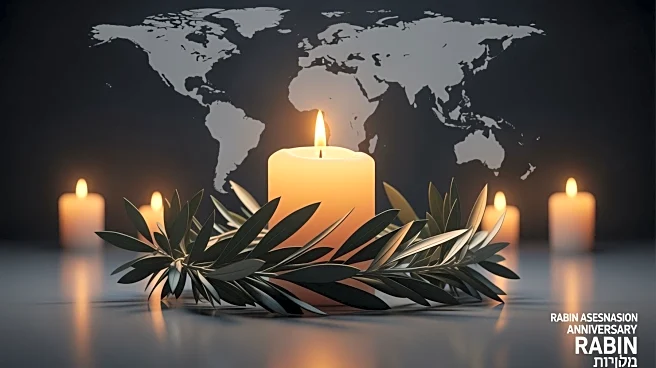What's Happening?
Diaspora Jewish communities around the world are commemorating the 30th anniversary of the assassination of Yitzhak Rabin, the former Prime Minister of Israel. The World Zionist Organization has organized a global memorial, and ceremonies are being held
across the United States and the United Kingdom. Rabin was assassinated in 1995, two years after the signing of the Oslo Accords between Israel and the Palestine Liberation Organization (PLO), which took place in Washington with President Bill Clinton presiding over the ceremony. These accords were a significant step towards peace in the region, and Rabin's assassination marked a pivotal moment in Israeli history.
Why It's Important?
The commemoration of Rabin's assassination is significant as it highlights the ongoing impact of his legacy on peace efforts in the Middle East. Rabin's leadership and the Oslo Accords were crucial in advancing dialogue between Israel and Palestine, and his assassination was a major setback to the peace process. The memorials serve as a reminder of the challenges faced in achieving lasting peace and the importance of continued efforts towards reconciliation. For American Jews and other diaspora communities, these events also reinforce their connection to Israel and the broader geopolitical dynamics affecting the region.
What's Next?
The commemoration events may lead to renewed discussions on the peace process in the Middle East, with potential implications for U.S. foreign policy and international relations. Stakeholders, including political leaders and peace organizations, might use this anniversary as an opportunity to advocate for renewed negotiations and strategies to address ongoing conflicts. The focus on Rabin's legacy could inspire new initiatives aimed at fostering dialogue and cooperation between conflicting parties.
Beyond the Headlines
The anniversary of Rabin's assassination also raises questions about the role of political violence in shaping historical narratives and the ethical considerations in commemorating such events. It highlights the cultural and emotional impact of Rabin's leadership on Jewish communities worldwide and the importance of preserving his vision for peace. Additionally, it underscores the need for vigilance against extremism and the promotion of democratic values.














